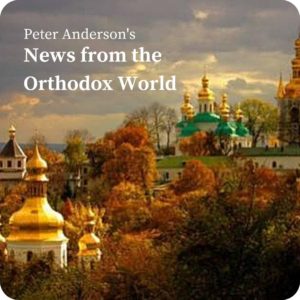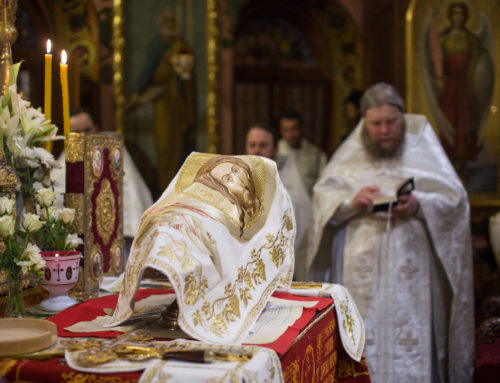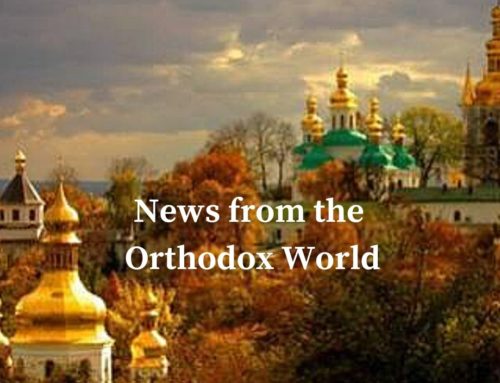Peter Anderson reports from the Orthodox world.
Longstanding reporter of the news from the Eastern Church, Peter Anderson shares our dream of a unified Christianity. His love for Orthodoxy has driven him to this personal mission to share the news of East with the world through his email list. The Urbi et Orbi Foundation is proud to share his efforts and his insights with you.

The Serbian Patriarchate has announced that the assembly (sobor) of its diocesan bishops will begin with a liturgy at the Church of St. Sava in Belgrade on Monday, May 24. https://www.spc.rs/sr/saopshten
On May 19, the Serbian Patriarchate posted a notice limiting the media interviews that Patriarch Porfirije will give in the future. https://www.spc.rs/sr/odgovor_r
On Pascha, May 2, the Georgian independent television channel Formula News showed a 35-minute interview of Ecumenical Patriarch Bartholomew by Giorgi Targamadze. The entire interview can be viewed at https://www.youtube.com/watch?
There is one question and answer in the interview that has attracted the greatest interest. Because of the deficiencies of a Google translation, a person who is fluent in both Georgian and English has very kindly provided me with the following accurate English translation of the Georgian transcript for this question and answer:
Journalist: There is an opinion in Georgia, which we hear even from members of the synod, that recognition of autocephaly of the OCU is problematic because it may instigate recognition of autocephaly of the church in Abkhazia by the Patriarchate of Moscow. Is it possible or not? Is meddling into internal affairs of the Orthodox Church of Georgia canonical on the part of the Russian Church? I mean supporting separatist groups on the Abkhazian territory by the Moscow Patriarchate. [The last sentence is slightly corrected as it made no sense in Georgian.]
Patriarch: Of course [Moscow] does not have the right [to do so]. First of all, the Russian Church has no right to grant autocephaly not only to Abkhazia but to anyone [any other territorial church]. It does not have such a right. This is an exclusive right of Constantinople, as has been confirmed by the Orthodox tradition and practice throughout centuries. I will remind you, in 1970 Russia proclaimed autocephalous the Orthodox Church in America, not of all the Orthodox, [not] of all the Russian-speaking [orthodox] throughout America, but of only one part. This way Moscow made dependent on itself the wealthiest Orthodox in America. This pseudo-autocephalous church founded in 1970 has not been recognized by anyone until today. Only it [the OCA] calls itself the autocephalous church of America. I am going back to the issue and repeat that Russia can grant autocephaly neither to Abkhazia nor to anyone. On the other hand, interfering into the matters of the church in Abkhazia, as well as South Ossetia, is noncanonical since they belong to the jurisdiction of the Church of Georgia. It is bad that the Russian Church interfered into their activities. The Russian Church used for its own [purposes] political and military interventions in these regions, stepped into [the area] and stays [there]. Also, [Moscow] has its own bishop there, as far as I know, and benefits under the current circumstances. Concerning your words: ‘If the Church of Georgia recognizes autocephaly of the Church in Ukraine, then the Patriarchate of Moscow will recognize autocephaly of Abkhazia’ – speaks of oppression and blackmail that has no basis. It is bad that the Russian Church interferes in the internal affairs of your church. It is bad that [Moscow] interferes anywhere it can. It has/[suffers from] the sickness of becoming the third Rome, desires to expand, to lead the whole Orthodoxy, but this intention is in vain, since the fall of Constantinople, it [Moscow] attempted several times to realize an idea of the third Rome, becoming the leader of the Orthodox; however, as you see, it’s been 600 years since the fall of Constantinople, 600 years have passed, – but it could not achieve its wish and will never be able to do so because the Orthodox Church has its own canonical system, its own tradition and practice. We Orthodox are one big family. We consider Constantinople as mother [church] to many churches and the coordinating center of the Orthodox; [we] wish unity, to love our brothers and our churches but also demand observance of church canons/Canon law which have protected us throughout these ages and led us up to this point.
When I first read this answer, I was puzzled by the Ecumenical Patriarch’s reference to “Moscow made dependent on itself the wealthiest Orthodox in America.” On further research, I now believe that the Ecumenical Patriarch is referring to the fact that the tomos which was granted by Moscow to the “The Autocephalous Orthodox Church in America” carved out and reserved to itself over 40 parishes including the presumably wealthy “St. Nicholas Cathedral and its possessions” in Manhattan, New York City. See https://www.oca.org/history-ar
On May 15, RIA Novosti posted an interview in which Metropolitan Hilarion (Moscow Patriarchate) disputed many of the statements made by Ecumenical Patriarch Bartholomew in the above answer. https://ria.ru/20210515/ilario
Metropolitan Hilarion does not address the question of whether the Moscow Patriarchate, which is the largest Local Orthodox Church and which some say contains more than half of the world Orthodox, does not seek to become the de facto leader of the Orthodox world. One need not be the first in the diptychs or have a primacy of authority or claim the title of “Third Rome” in order to exercise the greatest influence in the Orthodox world.
In my personal opinion, the foregoing question asked by journalist Giorgi Targamadze reflects either a lack of knowledge by the journalist or an inadvertent use of the word “autocephaly” rather than “autonomy.” Abkhazia is a relatively small territory with a current population of approximately 245,000, of whom approximately 60 percent consider themselves Christian. At the present time, there appears to be no Orthodox priests in Abkhazia who regard themselves as members of the Georgian Orthodox Church. The major church organization in Abkhazia is now the “Abkhazian Orthodox Church,” headed by the priest Vissarion Apliaa. On February 28, Apliaa gave an interview to news agency Sputnik and stated: “The Moscow Patriarchate will help us in our independent position. The Russian Orthodox Church will support the establishment of an autonomous church in Abkhazia, it is too early to talk about autocephaly, first we need to restore autonomy.” https://sputnik-abkhazia.ru/Ab
In other news, the Deputy Minister for Foreign Affairs of Ukraine Vasyl Bodnar met with Ecumenical Patriarch Bartholomew on May 17 to discuss the details of the program of the Ecumenical Patriarch’s visit to Kyiv next August. https://religionpravda.com.ua/
Peter Anderson, Seattle USA


